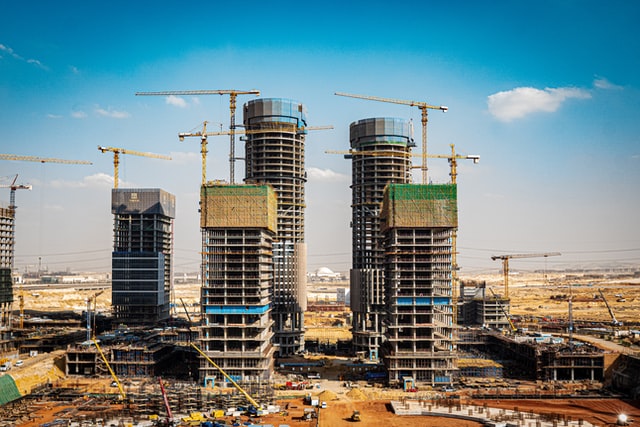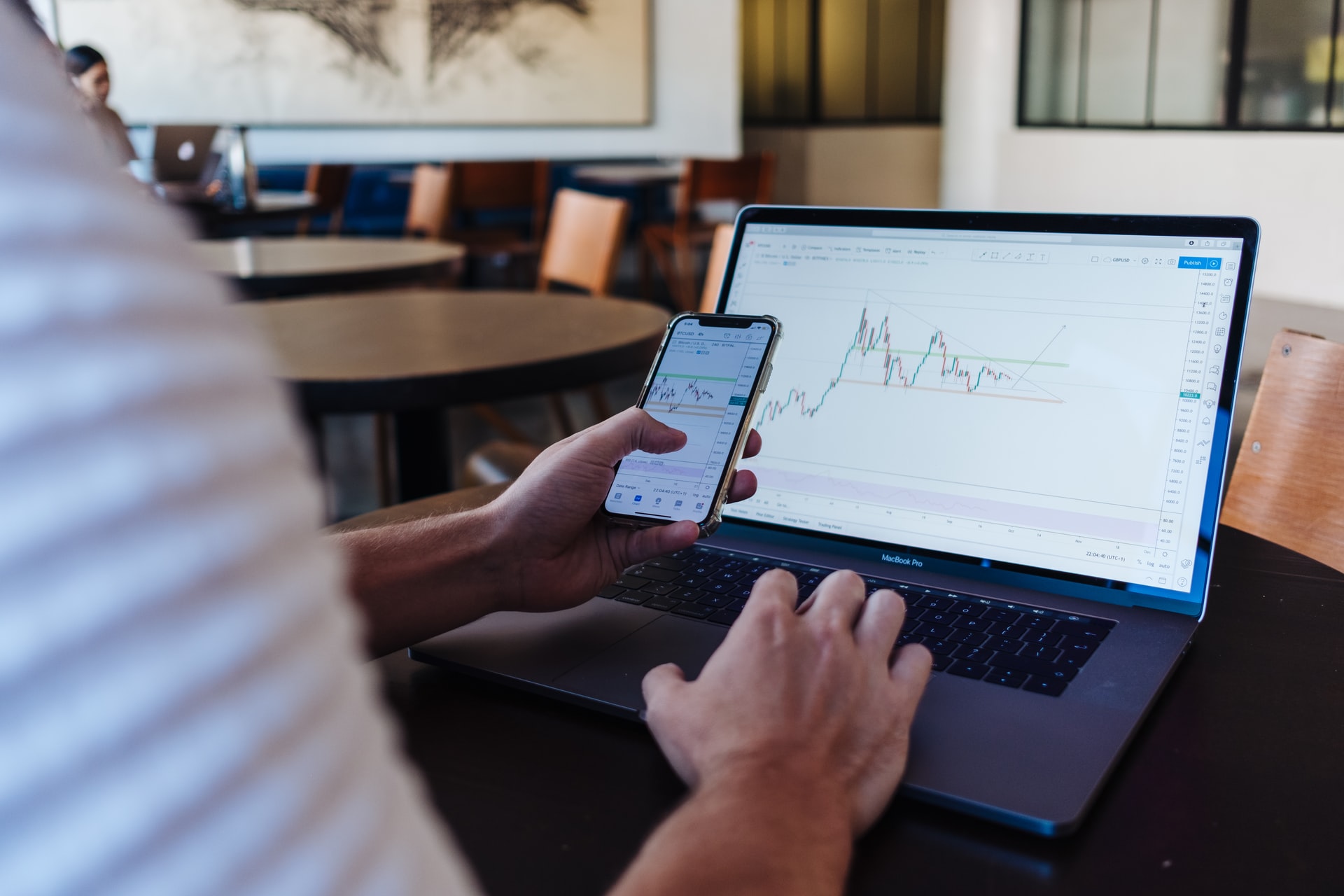
The stock market’s reaction to a potential default of Evergrande was swift and severe. On Monday, 20th September, the Dow Jones, S&P 500, and Nasdaq were down 2.23%, 2.24%, and 2.63%, respectively. Even though this was a few weeks ago, fear in the stock market persists. For instance, 29th September saw the Nasdaq fall 2.8%, the worst posting date since March. Thus, the echoing question in many investors’ minds is: how will the Evergrande crisis affect my portfolio?

In This Article
How did Evergrande get here?
Evergrande seems to have been running something comparable to a Ponzi scheme. They collected money from the pre-sale of apartments, used it to make down-payments for loans that would fund new development, collected more money from the pre-sale of these new developments, and the cycle continued.
Generally, this arrangement should work as long as house prices keep going up and the apartments continue to sell at a profit. But as soon as there’s the slightest slowdown, the whole thing could come crumbling down like a house of cards.
So, it all seems like Evergrande’s fault, right? Shouldn’t such companies be let alone to face the consequences of their carelessness?
Before putting all the blame on Evergrande, let’s have a look at China’s real estate market and the role the Chinese government played in this mega-disaster.
China’s real estate bubble
China’s economic growth, for the last few decades, has largely been fueled by real estate. The industry accounts for approximately 29% of China’s GDP. However, the property market in the country has become more and more speculative. So much so that about 20% of the housing inventory is unoccupied. The number of empty apartments is so large it can accommodate about 90 million people, enough to provide housing for the entire population of the UK and have some leftover.
The Chinese government was aware of the situation for many years. Still, it was reluctant to make any changes since it profits massively from the sale of land to real estate developers like Evergrande. You see, the government owns all the land in China. Individuals and corporations can only lease land for a set number of years (about 70 years). Corruption within government makes land extremely expensive and, in turn, causes such high home prices that the situation can only be described as a bubble.
For Evergrande and other developers, borrowing money was the only way to keep up with the high construction and land acquisition costs. Since the Chinese real estate market showed no signs of slowing down, these companies continued borrowing vast sums of money to support their operations.

The policy that brought Evergrande to its knees
Not until last year did the government begin to get worried about the financial impact of a real estate bubble. So, in August 2020, it instituted a new financing policy for real estate companies called “three red lines.” As the name suggests, the new policy set three red lines that would control the level of debt in the industry:
- The asset-liability ratio of Chinese real estate companies should not exceed 70%
- The net debt ratio should not be greater than 100%
- The ratio of cash to short-term debt should not be less than 1.
This is how Evergrande fared:
- An asset-liability ratio of 82%
- A net debt ratio of 199%
- The cash to short-term ratio was 0.4 times.
The new rules pulled the rug right under Evergrande’s feet. The company, which once had a powerful ability to raise funds, found it difficult to obtain financing from any financial institution. As a result, Evergrande suddenly suffered a liquidity crunch. Its debt problems began to surface as it was forced to suspend construction and delay payments to its suppliers and employees. The pandemic did not make matters any better as supply chain issues arose and the cost of materials skyrocketed. Soon enough, the company could no longer meet its interest obligations.
So, how contagious is the risk?
If history is anything to go by, the collapse of a big company, like Lehman Brothers, has always had a lasting cascading effect. While Evergrande hasn’t collapsed yet, the real estate giant has defaulted twice on its coupon payments to bondholders. Even worse, the company has not announced any plan to make these payments to investors.
Here’s how things could unfold as the Evergrande saga continues:
- Evergrande is unlikely to be able to sell their unfinished buildings as no developer or investor wants to buy a half-completed project that could fall in value.
- Chinese homebuyers who put down deposits for new homes will be left holding the bag and will have to start from scratch.
- The suppliers will have to foot the bill for delivered goods and materials that have not been reimbursed. It could drive many small businesses into bankruptcy.
- Many people employed in the real estate industry and other related sectors would lose their jobs, leading to a slowdown in the retail sector or, even worse, causing household debt defaults.
- Investors and banks who hold their debt are likely never going to get their money back.
- Banks and lenders whose balance sheets can’t swallow the debt will be inclined to sell other assets to raise capital, putting downward pressure on the market.
- Investors who hold shares in real estate stocks will lose money as vast chunks of market caps are wiped out.
- All the above factors could cause a collapse of the entire real estate market and all other sectors associated with it. Eventually, it could spread globally, affecting companies with investments in China.
Signs of distress are starting to appear in the overall Chinese property market. For example, in early October, Fantasia Holdings defaulted on its $206 million bond payments. In addition, Sinic Holdings, another real estate developer, had some of its units miss interest payments and is consequently undergoing a rating downgrade.
Contagion to the global market
The stress is now spreading to the commodities markets, such as steel and aluminium. The Chinese real estate industry is the biggest consuming sector in the global metals economy. As the Chinese market slows down, demand for commodities has taken a hit and is likely to weigh down on prices.
While we’re yet to precisely determine which global companies hold Evergrande’s debt, the currently available information shows that most of the debt is owed to the Chinese financial institutions and domestic investors. Thus, the initial symptoms of contagion are likely to be experienced in the Chinese financial sector. As more developers default on their debt, banks will be unable to take up any more losses.
How the Evergrande saga might affect you
In order to raise capital, Evergrande issued bonds to both domestic and foreign markets. Out of $300 billion of Evergrande’s debt, about $21 billion is denominated in foreign currency and thus owed to foreign investors.
While we don’t have a complete list of all these foreign investors, we know that the biggest holders of Evergrande’s dollar bonds include BlackRock, Vanguard, Ashmore, HSBC, UBS, and Goldman Sachs. You might already be aware that these institutions and banks package these loans and sell them to individual investors like you and me. Thus, any emerging markets investment vehicle – like mutual funds, ETF, etc. – you buy from one of these companies will likely contain either Evergrande’s bonds or other Chinese real estate developers’ debt.
Now, even though these companies have millions tied in Evergrande’s debt, it’s worth noting that it’s just a drop in the bucket compared to the worth of their entire portfolio. For example, BlackRock has $9 trillion in AUM(Assets Under Management ) and a $400 million exposure to Evergrande. So if Evergrande were to collapse, it wouldn’t put a dent in Blackrock’s portfolio.
However, an investor heavily exposed to one of these investment companies’ emerging market mutual funds would take a considerable hit on their portfolio. It’s therefore crucial for individual investors to know the exact contents of their mutual funds and ETFs.
Here’s another possible outcome: Chinese companies are also exposed to the US market. So if they get into a situation where they need money, it would be logical to sell off these assets to improve liquidity ratios, thus putting downward pressure on the US stock market, as we saw in September. This could affect your portfolio too.
Read More:

















